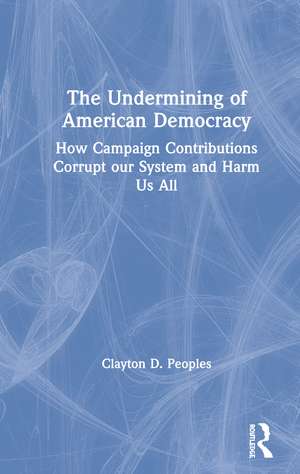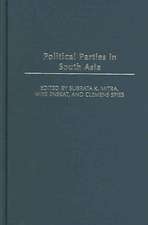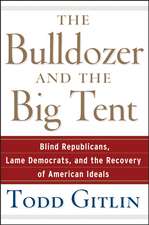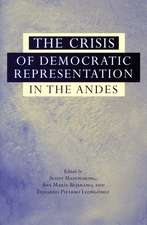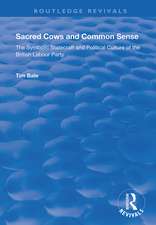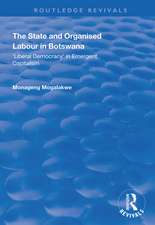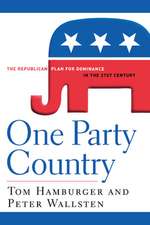The Undermining of American Democracy: How Campaign Contributions Corrupt our System and Harm Us All
Autor Clayton D. Peoplesen Limba Engleză Paperback – 18 sep 2019
| Toate formatele și edițiile | Preț | Express |
|---|---|---|
| Paperback (1) | 366.08 lei 6-8 săpt. | |
| Taylor & Francis – 18 sep 2019 | 366.08 lei 6-8 săpt. | |
| Hardback (1) | 761.34 lei 6-8 săpt. | |
| Taylor & Francis – 25 sep 2019 | 761.34 lei 6-8 săpt. |
Preț: 366.08 lei
Nou
Puncte Express: 549
Preț estimativ în valută:
70.06€ • 76.07$ • 58.85£
70.06€ • 76.07$ • 58.85£
Carte tipărită la comandă
Livrare economică 23 aprilie-07 mai
Preluare comenzi: 021 569.72.76
Specificații
ISBN-13: 9780367342777
ISBN-10: 0367342774
Pagini: 138
Ilustrații: 3 Tables, black and white; 1 Halftones, black and white; 1 Illustrations, black and white
Dimensiuni: 138 x 216 x 12 mm
Greutate: 0.37 kg
Ediția:1
Editura: Taylor & Francis
Colecția Routledge
Locul publicării:Oxford, United Kingdom
ISBN-10: 0367342774
Pagini: 138
Ilustrații: 3 Tables, black and white; 1 Halftones, black and white; 1 Illustrations, black and white
Dimensiuni: 138 x 216 x 12 mm
Greutate: 0.37 kg
Ediția:1
Editura: Taylor & Francis
Colecția Routledge
Locul publicării:Oxford, United Kingdom
Public țintă
Postgraduate and UndergraduateCuprins
Chapter 1: Introduction, Chapter 2: Campaign Finance Landscape, Chapter 3: What Contributions Do, Chapter 4: Implications for the Economy, Chapter 5: Implications for Social Inequality, Chapter 6: Implications for our Democracy, Chapter 7: Implications for Theories of Power Structure, Chapter 8: Political Reform
Notă biografică
Clayton D. Peoples, Ph.D., is a faculty member in the Sociology Department at the University of Nevada, Reno. He received his Ph.D. from The Ohio State University and was an Edmond J. Safra Lab Fellow at the Edmond J. Safra Center for Ethics at Harvard University.
Recenzii
"This comprehensive analysis of the impact of campaign contributions on legislative success has the great virtue of explaining complicated issues in ways that are clear to those who are fresh to the topic, while at the same time providing convincing original results that may come as a surprise to those who already know the basics of the campaign-finance literature. Indeed, it presents revealing new discoveries using statistical techniques that demonstrate the major role of financial donations to the 1999 and 2000 laws that contributed most heavily to the Great Recession of 2008, which is worth the price of admission alone. This book has to be seen as the starting point for anyone new to the issue as well as for those social scientists who aim to advance our knowledge of campaign finance as it becomes increasingly important in determining legislative outcomes." —G. William Domhoff, author of Who Rules America
"Let this book finally put to rest the suggestion among some academics that money in politics does not matter. With clarity and directness, Clayton Peoples complements an important political science debate with the skill and sensitivity of sociology. The upshot is not pretty, at least for the Republic, a democracy deeply corrupted by money, and an urgent need to fix it." —Lawrence Lessig, Roy L. Furman Professor of Law and Leadership, Harvard Law School, USA
"Let this book finally put to rest the suggestion among some academics that money in politics does not matter. With clarity and directness, Clayton Peoples complements an important political science debate with the skill and sensitivity of sociology. The upshot is not pretty, at least for the Republic, a democracy deeply corrupted by money, and an urgent need to fix it." —Lawrence Lessig, Roy L. Furman Professor of Law and Leadership, Harvard Law School, USA
Descriere
A growing body of evidence shows that special interests have disproportionate sway over policy via campaign contributions and lobbying. In this book, the author presents this evidence in a logical, understandable way; he then illustrates how campaign contributions harm our economy, exacerbate inequality, and undermine our democracy.
